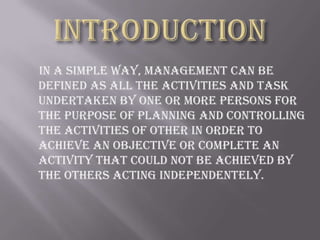Future of management
- 1. A THEoRITICAL RESEARCH BY…. GROUP A5 ST SEM MBA+PGPBM) (1
- 2. IN A SIMPLE WAY, MANAGEMENT CAN BE DEFINED AS ALL THE ACTIVITIES AND TASK UNDERTAKEN BY ONE OR MORE PERSONS FOR THE PURPOSE OF PLANNING AND CONTROLLING THE ACTIVITIES OF OTHER IN ORDER TO ACHIEVE AN OBJECTIVE OR COMPLETE AN ACTIVITY THAT COULD NOT BE ACHIEVED BY THE OTHERS ACTING INDEPENDENTELY.
- 3. People have been shaping and reshaping organizations for many centuries. Looking back through world history we can trace the stories of people working together such as in GREEK and ROME armies, the roman catholic church, the east India Company and the Hudson Bay Company. People have also been writing about how to make oRGAnIzATIon EFFICIEnT AnD EFFECTIVE… SInCE LonG BEFoRE TERm SUCH AS “mAnAGEmEnT” came into common usage.
- 4.  One such author, Henry Fayol (1841 – 1925), known as the father of modern mAnAGEmEnT, WAS EURopE’S moST distinguished management author and the first to develop a general theory of management. He maintained that mAnAGEmEnT IS “To FoRECAST AnD To plan, to organize, to command, to cooRDInATE AnD To ConTRoL”. THE BASIS oF his theory is that organizational activities can be classified into technical, commercial, financial, security, accounting or managerial activities.
- 5.  FREDRICK WINSLOW TAYLOR - "Management is the art of knowing what you want to do and then seeing that they do it in the best and the cheapest may."  HENRY FAYOL -  GEORGE R. TERRY - ''Management Is a distinct mAnAGEmEnT IS “To FoRECAST AnD to plan, to organize, to command, to co-ordinate AnD To ConTRoL” process consisting of planning, organizing, actuating and controlling; utilizing in each both science and art, and followed in order to accomplish pre-determined objectives.  HOROLD KOONTZ - "Management is the art of getting things done through others and with formally organized groups."
- 7. Economy won‟t be entirely free of executives, supervisors, administrators and overseers. But it does imply a future in which the “work of management” is less and less the responsibility of “managers.” To be sure, activities will still need to be coordinated, individual efforts aligned, relationships nurtured, objectives decided upon, and knowledge disseminated. But increasingly, this work will be distributed out to those on the
- 8. PAST ÔÇ® ÔÇ® ÔÇ® ÔÇ® Customers have always valued experience CRM has been mainly concerned with how to market to customers and get valued from them. Market was open and competition was less. Options for innovation PRESENT ÔÇ® ÔÇ® ÔÇ® ÔÇ® Listening to voice of customers, building the business case. Customer feedback is first step towards CRM success. Market is still open but competition is more. Creative innovations required.
- 9.    These days, most companies are aware of the importance of customer experiences to build loyalty and retain customers. In difficult economies or maturing markets, the "easy money" of new customer acquisitions is gone. Over the next few years, companies should expand their VoC efforts to listen to the customers and the market more completely. Unstructured and often unsolicited feedback—from social media and many other sources—is a goldmine of insight waiting to be discovered. Further, it's time to stop being reactionary. Yes, it's important to fix problems because they're a negative drain on the customer experience. But it's equally important to proactively create innovative new experiences that differentiate the company
- 12.    the biggest mistakes which companies are making is trying to run when they should be walking. strategy must needed to be built based on a market position and maturity. Firstly, try’s to "wow" the customers with creative experiences and later ,call center won't answer the phones.( no response to feed back and complaints)
- 13.  STOP THE BLEEDING – we should try to fix the problems.  FOCOUS ON SELECTION - take some time to study the end-to-end customer experience and learn which interactions or "touch points" matter most.  INNOVATE - fixing problems and optimizing touch points will only take us so far; probably not to industry leadership. mostly needed to create entirely new experiences.  CONCEPTUALY CRAFTED – it has to be well planned and needed to be followed with alternatives ideas or cover.
- 14. the typical knowledge and skills in the areas of reading, writing, and arithmetic are no longer sufficient for managers. ÔÇ® critical thinking and problem-solving skills. ÔÇ® communication skills. ÔÇ® collaboration skills, creativity and innovation skills. Bottom line: Evaluate your knowledge, skills, strengths, and weaknesses, create a career development plan, find career coaches and mentors, and focus on continuous learning throughout your entire career. ÔÇ®
- 15. ÔÇ® ÔÇ® ÔÇ® ÔÇ® Rethinking the philosophical foundations of management towards a higher and nobler purpose. Redesigning the organization into a more open, democratic and inclusive community. Rethinking leadership and control towards a more equitable self-managing power-structure Reinventing management education and training towards a more right-brain thinking.
- 22.       PURPOSE STRATEGY MAKING OPEN ORGANIZATION WHERE WORK CAN FLOW THROUGH EVERY EMPLOYEE. SELF MANAGING POWER HAS TO BE THERE MANAGEMENT EDUCATION HAS TO BE MODIFIED AGAIN AND AGAIN. REGULAR EVALUATION „S IS REQUIRED FOR KNOWLEDGE, SKILLS, STRENGTHS, WEAKNESSES, PLANS AND STRATEGIES !!
- 24. ÔÇ® ÔÇ® ÔÇ® ÔÇ® ÔÇ® ÔÇ® ÔÇ® ÔÇ® SIR GARY HAMMEL SPRINGER LINK INTEGRAL MASINGS IEEE DIGITAL LIBRARY WIKI ANSWERS .COM CNN.COM MANAGEMENT BOOKS AND SELF KNOWLEDGE.
- 25. SAHIL MUKHIA

























